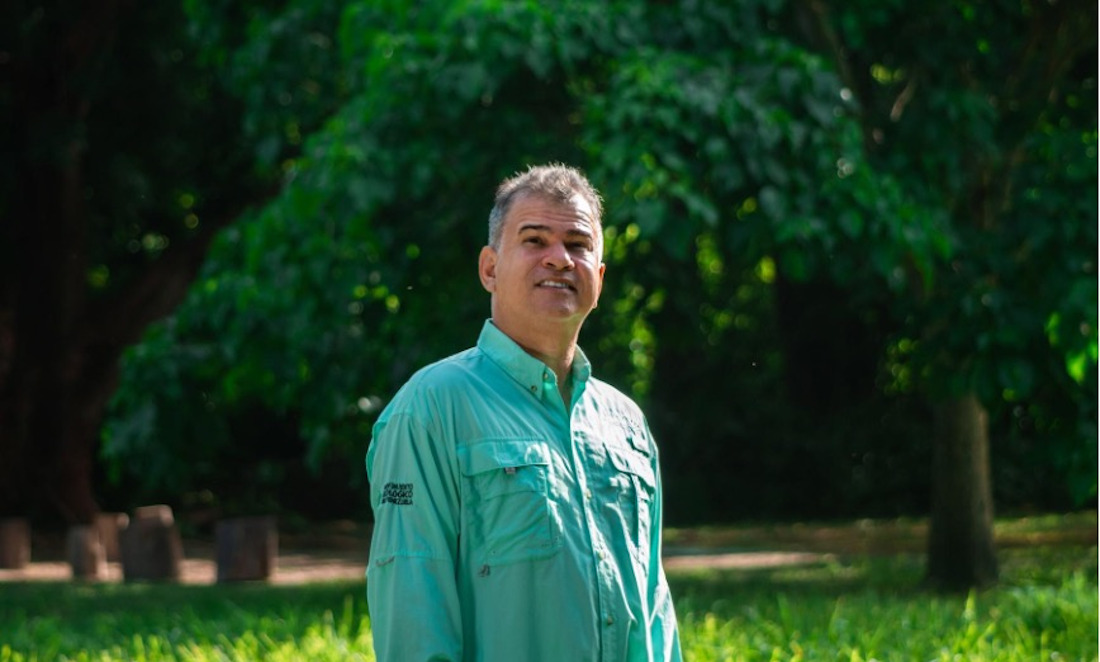FUNVIVE is a Venezuelan-based NGO that promotes climate action and has the largest network of volunteers in the country. With 12 years since its founding, POP visited its president, Manuel Díaz, to discover the secret of his success and the journey that led him to become the “Green Man”, an internationally commemorated figure.

On this occasion, the Green Man walked out of his office wearing a black coat and a smile from ear to ear. Although the little ones regularly confuse him with a fictional superhero because of his nickname and his tall stature, this Venezuelan hero looks as ordinary as you do.
Born in April 1963, he has four decades of experience in environmental activism and is a strategic member of ten international organizations that advocate for Sustainable Development Goals, such as FUNVIVE (president), the Green Citizen Foundation (vice president), and the Noble Order for Human Excellence (board member).
However, people mostly know him as that environmentalist who, in 2008, ran for Mayor of Naguanagua (a municipality in Carabobo State), winning everybody’s heart and his peculiar nickname. But, despite all his achievements, he is a simple gentleman who defines himself as “a mortal looking for happiness.”
An authentic example of self-improvement and ethical citizenship, he’s a man of humble origins who has become the most representative figure of environmental conservationism in several countries around the world. His name, Manuel Díaz.
The secret of his success: An intense minute
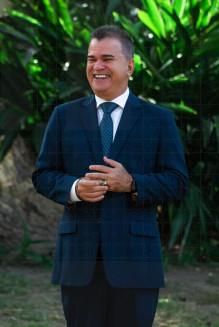 Díaz laughs every time he remembers how many people refer to him as a locomotive. He says they frequently ask his wife, “Where does he find so much time?” He thinks everything lies in good management and dedicating an intense minute to each activity.
Díaz laughs every time he remembers how many people refer to him as a locomotive. He says they frequently ask his wife, “Where does he find so much time?” He thinks everything lies in good management and dedicating an intense minute to each activity.
“When you know how to manage and dedicate an intense minute to each activity, you leave your mark. The important thing is to have discipline, value time off, reflect, spend time with family, and be disciplined. I really like order, and personal order begins with a balance in time. It’s possible that one day you either go to bed later or get up earlier, but you have to balance the hours of that day. And, if we assume any responsibility, we must try to complete the tasks in the best way possible,” he explained.
He considers that being constant and persevering in each responsibility that one takes is what makes the difference, besides feeling comfortable in the assumed activities.
“I question whether it’s worth what I’m doing”
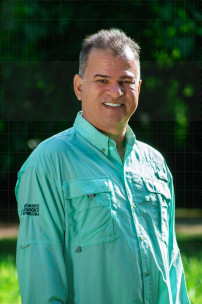 Although he is more than used to working every minute intensely and under pressure, he thoughtfully admitted that more than once he has questioned whether it is worth everything he does. He says that taking a step forward for the environment is exciting but also demanding, as it is “a mandate from God.”
Although he is more than used to working every minute intensely and under pressure, he thoughtfully admitted that more than once he has questioned whether it is worth everything he does. He says that taking a step forward for the environment is exciting but also demanding, as it is “a mandate from God.”
“I now have a spiritual peace in which I am focused on my pursuit of happiness and doing what I love to do. Right now, if you ask me where I’m headed, I would answer that all I do is enjoy and celebrate. It does not mean that I do not have stress or bad times, but those are things you even have to put aside to grab an impulse and move forward because preserving our planet is a mark that one has in the blood, in the consciousness, and in the actions.”
He stated the same can apply to every aspect of life, as one must reinvent oneself:
“Grabbing momentum and reinventing yourself,” he added, “is an interesting part of the process. Change is something a person should not be afraid of. Life is like the economy: you cannot depend on a single economic unit; you must have diversity regarding that because if you fail at one, the other units may keep you afloat. Life is a search for balance, a search for sustainability, and that includes both good and bad times.”
The steps of the Green Man
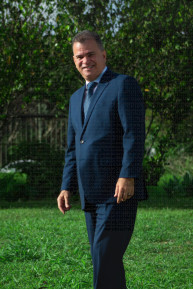 His path in the fight for the environment started at a very young age. “Manuelito”, as his relatives used to call him, comes from a humble family in Carabobo, whom he thanked for their instilled values, which he hopes will be passed from generation to generation now that he is a grandfather.
His path in the fight for the environment started at a very young age. “Manuelito”, as his relatives used to call him, comes from a humble family in Carabobo, whom he thanked for their instilled values, which he hopes will be passed from generation to generation now that he is a grandfather.
“When I was a kid, my fascinations were animals and cleaning the parking lot where I lived. I even used to tell my friends to do collections. In addition, we spent a lot of time planting trees, cleaning, and recycling. I subsequently discovered that there was a background to all of it, and eventually the opportunity to assume positions of public responsibility presented itself. I also had several people who marked my life,” he revealed.
Among those who marked his life are Misia Kathy Phelps, his mentor, and the former mayor of Valencia City, Argenis Escarri, who appointed him president of the former Municipal Institute of the Environment (1993). Both figures gave him the impetus to enter the fields of environmental conservationism and public administration, reaching various positions. However, he said that he is no longer interested in the public sector but in the private sector.
But what Dr. Manuel Díaz is truly passionate about is his family, about whom he speaks with a lot of emotion and almost tearful eyes. With five siblings and a biologist as a mother, he always sought to get ahead and cope with life’s challenges by including his entire family in it, which is why his mother still frequents his office. He is currently happily married, has grandchildren, and is the father of four professional daughters living abroad, whom he referred to as his greatest achievement.
“My greatest achievement is my family, my daughters, and having a stable relationship with my wife. Our eldest daughter is a civil engineer; the second is a lawyer; the third is a doctor; and the fourth is a dentist. My grandchildren and daughters are my strengths because I think you can value a human being by observing the relationship with his or her family; you see how he or she treats them and how they try to inspire that family model so that it is a replica for the rest of society,” he said.
The legacy of Manuel Díaz
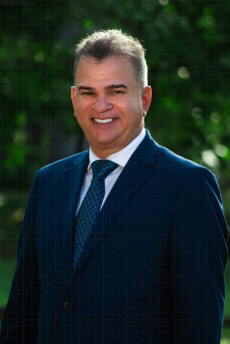 “My legacy is to contribute to future generations so they have a deeper awareness than previous generations have had regarding the environmental culture for young people and children, so we actually understand the great love for Mother Earth. That would make me the most cheerful man in the world. I will not rest until I breathe my last breath trying to contribute to environmental defense. I don’t plan to quit.”
“My legacy is to contribute to future generations so they have a deeper awareness than previous generations have had regarding the environmental culture for young people and children, so we actually understand the great love for Mother Earth. That would make me the most cheerful man in the world. I will not rest until I breathe my last breath trying to contribute to environmental defense. I don’t plan to quit.”
He firmly believes that the present environmental culture has forced people to understand the spiritual dimension of life and that humanity is part of an entire process focused on respecting Mother Earth. A citizen culture, which he referred to as “extremely important,” is even more relevant now that the pandemic has made it clear.
Díaz believes that today’s young person has to be “a lover” of nature who understands the spiritual aspect of it and values it every day since “everything environmental is spiritual” and “the only way to God is the union with nature.”
Finally, he encouraged young people not to waste time, to innovate, and to never forget the infinite love for this universe and this dimension of life that has the greatness of who we are.





